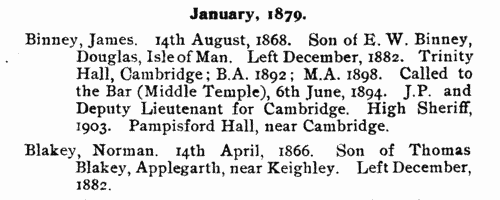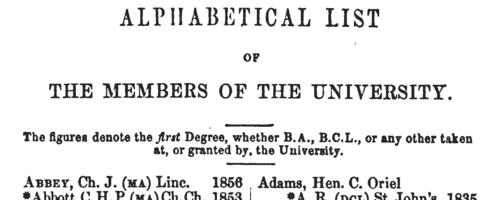Fell Surname Ancestry ResultsOur indexes 1000-1999 include entries for the spelling 'fell'. In the period you have requested, we have the following 844 records (displaying 561 to 570): Single Surname Subscription | | | Buying all 844 results of this search individually would cost £4,684.00. But you can have free access to all 844 records for a year, to view, to save and print, for £100. Save £4,584.00. More... |
These sample scans are from the original record. You will get scans of the full pages or articles where the surname you searched for has been found. Your web browser may prevent the sample windows from opening; in this case please change your browser settings to allow pop-up windows from this site. Trustees and solicitors in England and Wales
(1858)
Perry's Bankrupt and Insolvent Gazette, issued monthly, included lists of assignments of bankrupts' estates. Each entry gives the name of the bankrupt (surname first, in capitals), the date (in brackets), address and trade; followed by the names and addresses of the trustees to whom the estate was delivered, and the name and address of the solicitor. This is the index to the names of the trustees and solicitors, from the issues from January to December 1858.FELL. Cost: £6.00.  | Sample scan, click to enlarge

| Boys entering Giggleswick School
(1859)
The school at Giggleswick in the West Riding of Yorkshire dates from at least 1507, but no register of the boys attending there has survived earlier than one started by the headmaster, the reverend George Style, in 1875. When the bursar, H. L. Mullins, prepared this, 'The Giggleswick School Register', printed in 1913, he was able to compile general details of some scholars from earlier years, but the concerted, reasonably complete, account starts in 1859. The details are arranged by term of entry, then alphabetically by surname and christian name. Typically each description gives full name; date of birth; name and address of father; date of leaving. Where known, Mullins then added a brief career synopsis, present address in 1913, or date of death.FELL. Cost: £4.00.  | Sample scan, click to enlarge

| Newcastle-upon-Tyne Voters: Householders in Westgate
(1859)
In the general election of April 1859 the candidates for Newcastle-upon-Tyne the candidates were Thomas Emerson Headlam (H), George Ridley (R) and P. A. Taylor (T); the following June a poll was held to choose the Judge-Advocate General, the candidates being the Right Hon. T. E. Headlam (H) and William Cuthbert (C). This poll book lists all the voters, giving full name and address, and votes cast. The book is divided into two sections: freemen and householders. Within the householder section the names are arranged by parish or township: All Saints, Byker, Elswick, Heaton, Jesmond, St Andrew, St John, St Nicholas, and Westgate.FELL. Cost: £4.00.  | Sample scan, click to enlarge

| Patentees of New Inventions
(1859)
Abstracts of British patents for new inventions applied for and granted from 1 January to 31 December 1859: giving date, name and address, and short description of the invention. It is then stated whether 'Letters patent sealed' or 'Provisional protection only'.FELL. Cost: £6.00.  | Sample scan, click to enlarge

| Trainee Schoolmasters at Durham
(1859)
The Education Department set examinations of trainee teachers at the various training colleges in Britain. This is the class list of the men who took examinations at the Teacher Training College at Christmas 1859. The names are given for the second year first, arranged by division in the examination (in order of merit for the first and second divisions), and then for the students of the first year, arranged similarly. Full names are given (with initials for middle names). The letter (D.) indicates that the candidate had obtained a certificate of competency as a teacher of drawing. An asterisk signifies that the candidate had received a prize for proficiency in drawing. The sample scan is from an Edinburgh list of trainee schoolmistresses.FELL. Cost: £6.00.  | Sample scan, click to enlarge

| Members of Oxford University
(1860)
The Oxford University Calendar for 1860 includes this list of all living members of the university, i. e. not only undergraduates and members of staff, but also all surviving graduates from earlier generations. The names are arranged alphabetically by surname, then by college in order of foundation. Surnames are given, initials, highest degree, name of college, and then the year of graduating the first degree. For undergraduates only name and college is given. An asterisk before a surname indicates a member on the foundation of the college. FELL. Cost: £4.00.  | Sample scan, click to enlarge

| Patentees of New Inventions
(1860)
Abstracts of British patents for new inventions applied for and granted from 1 January to 31 December 1860: giving date, name and address, and short description of the invention. It is then stated whether 'Letters patent sealed' or 'Provisional protection only'.FELL. Cost: £6.00.  | Sample scan, click to enlarge

| Long-stay Paupers in Workhouses: Chelsea, St Luke
(1861)
This comprehensive return by the Poor Law Board for England and Wales in July 1861 revealed that of the 67,800 paupers aged 16 or over, exclusive of vagrants, then in the Board's workhouses, 14,216 (6,569 men, 7,647 women) had been inmates for a continuous period of five years and upwards. The return lists all these long-stay inmates from each of the 626 workhouses that had been existence for five years and more, giving full name; the amount of time that each had been in the workhouse (years and months); the reason assigned why the pauper in each case was unable to sustain himself or herself; and whether or not the pauper had been brought up in a district or workhouse school (very few had). The commonest reasons given for this long stay in the workhouse were: old age and infirm (3,331); infirm (2,565); idiot (1,565); weak mind (1,026); imbecile (997); and illness (493). FELL. Cost: £6.00.  | Sample scan, click to enlarge

| Long-stay Paupers in Workhouses: St Leonard, Shoreditch, Parish
(1861)
This comprehensive return by the Poor Law Board for England and Wales in July 1861 revealed that of the 67,800 paupers aged 16 or over, exclusive of vagrants, then in the Board's workhouses, 14,216 (6,569 men, 7,647 women) had been inmates for a continuous period of five years and upwards. The return lists all these long-stay inmates from each of the 626 workhouses that had been existence for five years and more, giving full name; the amount of time that each had been in the workhouse (years and months); the reason assigned why the pauper in each case was unable to sustain himself or herself; and whether or not the pauper had been brought up in a district or workhouse school (very few had). The commonest reasons given for this long stay in the workhouse were: old age and infirm (3,331); infirm (2,565); idiot (1,565); weak mind (1,026); imbecile (997); and illness (493). FELL. Cost: £6.00.  | Sample scan, click to enlarge

| Long-stay Paupers in Workhouses: St Pancras Parish
(1861)
This comprehensive return by the Poor Law Board for England and Wales in July 1861 revealed that of the 67,800 paupers aged 16 or over, exclusive of vagrants, then in the Board's workhouses, 14,216 (6,569 men, 7,647 women) had been inmates for a continuous period of five years and upwards. The return lists all these long-stay inmates from each of the 626 workhouses that had been existence for five years and more, giving full name; the amount of time that each had been in the workhouse (years and months); the reason assigned why the pauper in each case was unable to sustain himself or herself; and whether or not the pauper had been brought up in a district or workhouse school (very few had). The commonest reasons given for this long stay in the workhouse were: old age and infirm (3,331); infirm (2,565); idiot (1,565); weak mind (1,026); imbecile (997); and illness (493). FELL. Cost: £6.00.  | Sample scan, click to enlarge

|
Research your ancestry, family history, genealogy and one-name study by direct access to original records and archives indexed by surname.
|












